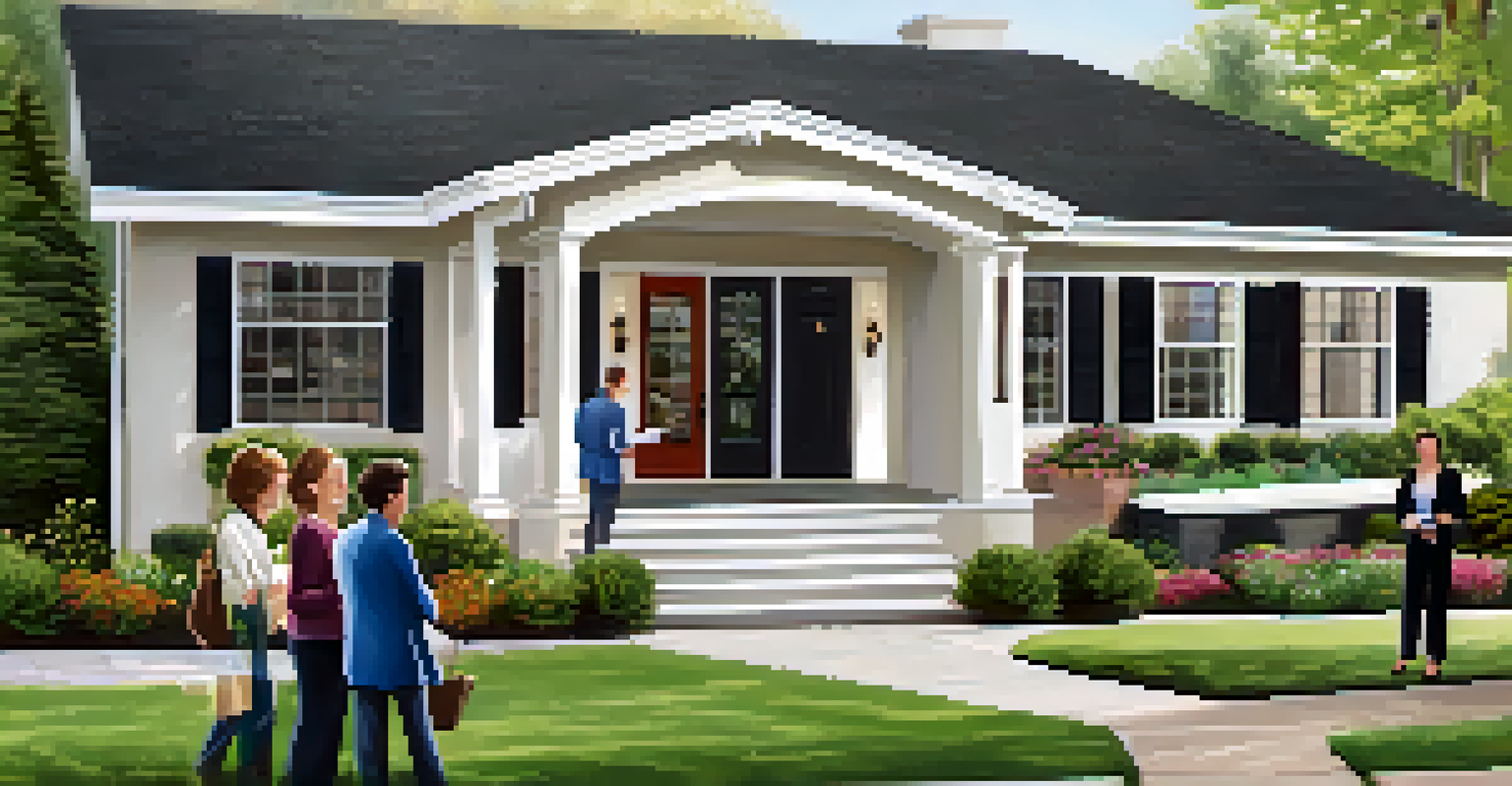How to Leverage Open Houses for Flipped Properties

Understanding the Importance of Open Houses in Real Estate
Open houses play a pivotal role in the real estate market, especially for flipped properties. They provide a unique opportunity for potential buyers to walk through the home and envision themselves living there. This personal connection can often lead to faster sales, as buyers get to experience the space first-hand.
A house is made of walls and beams; a home is built with love and dreams.
Moreover, open houses allow real estate agents and flippers to showcase the renovations and upgrades made to the property. Highlighting these improvements can significantly increase the perceived value of a home. When buyers see the quality of work in person, they're more likely to be impressed and make an offer.
In a market where online listings are the norm, open houses can set your property apart. They create a sense of urgency and excitement, drawing in multiple buyers at once. This competitive atmosphere can often lead to better offers and a quicker sale.
Preparing Your Property for a Successful Open House
Preparation is key when it comes to hosting an open house for a flipped property. Start by decluttering and cleaning the home to create a welcoming atmosphere. A tidy space allows potential buyers to focus on the house’s features rather than their personal belongings.

Next, consider staging the home to highlight its best attributes. This could mean rearranging furniture or even bringing in rental pieces to create an inviting environment. Think of staging as setting the scene in a movie; it should evoke the right emotions and help buyers imagine their lives in the space.
Open Houses Boost Buyer Engagement
Open houses create a personal connection for buyers, enhancing their likelihood of making an offer.
Lastly, don’t forget about curb appeal. The exterior of the home is the first thing buyers will see, so make sure it’s inviting. Simple touches like fresh landscaping, a clean driveway, and a welcoming front door can make a significant difference in attracting visitors.
Timing Your Open House for Maximum Attendance
The timing of your open house can greatly impact attendance and interest. Weekends are typically the best days, as potential buyers are often freed from work commitments. Aim for a time in the late morning or early afternoon when people are more likely to be out and about.
The best investment on Earth is earth.
Consider local events or holidays that might affect attendance. For example, if there's a big local festival or event, you might want to choose a different weekend to avoid competition for visitors' attention. It’s all about picking a time when your target audience is available.
Finally, promote your open house well in advance. Use social media, local real estate websites, and community boards to spread the word. The more people know about your open house, the higher the chances of attracting serious buyers.
Creating Engaging Marketing Materials for Your Open House
Engaging marketing materials can significantly enhance the appeal of your open house. Start with eye-catching flyers that highlight the key features of the property. Use high-quality photos and compelling descriptions to draw in potential buyers.
Additionally, consider utilizing digital marketing strategies, such as social media ads or email campaigns. These platforms allow you to reach a broader audience quickly. Make sure to include attractive visuals and a clear call-to-action to encourage attendance.
Preparation Enhances Property Appeal
Decluttering, staging, and improving curb appeal are crucial steps to attract potential buyers during an open house.
Lastly, consider creating a virtual tour of the property to complement your marketing efforts. This gives interested buyers a sneak peek before the open house, increasing their excitement and likelihood of attending. Combining traditional and digital marketing will maximize your reach.
Welcoming Guests: The Art of Hosting an Open House
When hosting an open house, make sure to create a welcoming environment for guests. Greet each visitor with a smile and offer them a flyer or information packet about the property. This personal touch can set a positive tone for their visit.
As guests walk through the home, be available to answer questions and provide insights about the renovations. This is your chance to showcase the work put into the property and highlight its features. Engaging with visitors can help them feel more connected to the home.
Finally, consider providing refreshments to create a comfortable atmosphere. Simple snacks and drinks can make a lasting impression. When guests feel comfortable, they are more likely to spend time exploring the property and envisioning themselves living there.
Collecting Feedback to Improve Future Open Houses
After hosting an open house, it's essential to collect feedback from attendees. This information can help you understand what potential buyers liked or disliked about the property. You can ask questions verbally or provide a short survey for guests to fill out.
Analyzing this feedback can reveal valuable insights about your home’s strengths and weaknesses. For example, if multiple visitors mention that the kitchen feels cramped, you might consider redesigning that space for future flips. Listening to buyer input is crucial for continuous improvement.
Follow-Up is Key After Open Houses
Timely follow-ups with interested buyers can keep your property top-of-mind and encourage further interest.
Additionally, collecting contact information from attendees allows you to follow up after the event. This can be a great way to gauge interest or provide additional information. Building relationships with potential buyers can lead to opportunities down the road.
Closing the Sale: Best Practices Post-Open House
Once your open house has concluded, the next step is to follow up with interested buyers. Reach out to those who attended and express your gratitude for their visit. This personal touch can help keep your property top-of-mind and encourage further interest.
If you received inquiries during the open house, be prompt in providing additional information. Timely responses can make a significant difference in a buyer's decision-making process. The faster you can address their questions, the more likely they are to consider making an offer.

Finally, remain engaged with potential buyers throughout the closing process. Keep communication lines open and be available to negotiate. Building rapport can lead to a smoother transaction and ultimately a successful sale.